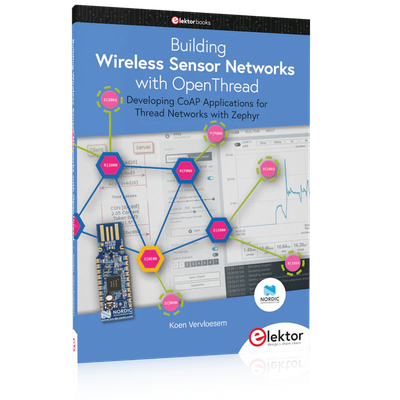Building Wireless Sensor Networks with OpenThread: Developing CoAP Applications for Thread Networks with Zephyr
This book will guide you through the operation of Thread, the setup of a Thread network, and the creation of your own Zephyr-based OpenThread applications to use it. You’ll acquire knowledge on:
The capture of network packets on Thread networks using Wireshark and the nRF Sniffer for 802.15.4.
Network simulation with the OpenThread Network Simulator.
Connecting a Thread network to a non-Thread network using a Thread Border Router.
The basics of Thread networking, including device roles and types, as well as the diverse types of unicast and multicast IPv6 addresses used in a Thread network.
The mechanisms behind network discovery, DNS queries, NAT64, and multicast addresses.
The process of joining a Thread network using network commissioning.
CoAP servers and clients and their OpenThread API.
Service registration and discovery.
Securing CoAP messages with DTLS, using a pre-shared key or X.509 certificates.
Investigating and optimizing a Thread device’s power consumption.
Once you‘ve set up a Thread network with some devices and tried connecting and disconnecting them, you’ll have gained a good insight into the functionality of a Thread network, including its self-healing capabilities. After you’ve experimented with all code examples in this book, you’ll also have gained useful programming experience using the OpenThread API and CoAP.
Titel |
Building Wireless Sensor Networks with OpenThread: Developing CoAP Applications for Thread Networks with Zephyr |
Auteur |
Koen Vervloesem |
Publicatiedatum |
2024-05-02 |
Aantal pagina's |
256 |
ISBN-13 |
978-3-89576-618-3 |
Uitgeverij |
Elektor International Media (EIM) |
Het boek is in de Elektor Store of in je favoriete boekenwinkel te bestellen.
De codevoorbeelden uit het boek vind je in de bijbehorende GitHub-repository en zijn vrijgegeven onder de opensource MIT- en Apache 2.0-licenties. Ook de errata vind je daar, evenals een lijst met extra tips en interessante projecten die niet in het boek vermeld zijn.
